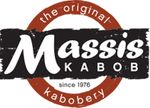
What is the difference between Kabob vs Kebab vs Kabab?

What is the difference between Kabob vs Kebab vs Kabab?
What is the difference between Kabob vs Kebab vs Kabab?
By: M. Kablogger
Short Answer: Nothing. It all refers to the same food with a different spelling and slightly different pronunciation.
Detailed Answer: For the purposes of this article I will refer to the item in question as Kabob, which is how we spell it at Massis Kabob. Kabob has its origins in the middle east and is simply skewered meat grilled over fire. You can also add vegetables like peppers and tomatoes which taste great grilled but the main course is usually grilled meat served often with sides like rice, shirazi, hummus and bread.
The grill can be wood-fired, charcoal, or for most modern cooking on a natural gas grill. Long ago someone figured out that if you cut the pieces of meat into smaller pieces and put it on a piece of metal you can grill the food without it touching grill grates or a metal pan or surface. The meat cooks quickly and evenly and stays moist and juicy.
Massis Kabob in 4K
Ok so back to the different spellings and pronunciations. Kabob with a “Bob” would most likely be used by people from countries such as Iran or Armenia whereas Kebab or Kabab (spelled with two "a"s) would be used in Arabic-speaking countries such as Lebanon or Syria.
Some people will try to argue that the words as they are spelled are related to the English-speaking country i.e. the United States versus the UK. There might be some truth to that but the only reason for that is that the word most likely arrived with the dominant immigrant group that brought the food and culture with them.
Even with a country like the US, you may have different spellings of the word based on where in the country you are located in. If you look at a region such as Southern California where there’s a large influx of Armenians and Iranians the more predominant spelling may be KABOB (see Google Trends my area ). Kabob is the more dominant spelling and restaurants like Massis Kabob which have been around since 1976 and are one of the oldest businesses serving kabob in the area have that spelling. In a place like Michigan where you have a huge Arab population like in the suburbs of Dearborn outside Detroit this same word might be spelled with the BAB as Kebab.
With many Middle Eastern or Mediterranean dishes and foods lots of countries claim to be the originator and you know some may have a claim to the food but the reality is it’s hard to define exactly where each food comes from we can look at countries with large populations who have had a lot of food which has traveled from country to country and then we can look at countries or regions where the food has mostly stayed in the region so the food has not the traveled. In a region like Southern California, you have lots of immigrants and so you’re going to have lots of different types of food. In Los Angeles alone 185 languages are spoken so with that comes a lot of foreign foods and dishes.
Like most cuisine Kabob or Kebab was not really invented at any one place in fact it’s probably a combination of years and years of taking something from some culture and applying their twist to it so if you’re in a region that has peppers perhaps you put peppers if you’re in a region that doesn’t have peppers or doesn’t like spicy food then sometimes those things are eliminated in fact even Kabob as it came to the United States has changed over the years at Massis Kabob we serve a Persian Armenian style Kabob whereas our sides and appetizers are more Arabic style appetizers.
Four instance Hummus, is traditionally not served in any Iranian/Persian kabob restaurants nor is taboule (or tabouli, tabbouleh)but now customers have the expectation to get hummus at a Persian restaurant so many have added it to their menus over the years. In the early 80s, Massis Kabob was serving a kabob with all of the same sides that people love giving the best of both worlds of the cuisine but over the years we’ve even added certain items in our menus. We serve four types of fish which are not usually served in kabob restaurants and we also serve grilled jalapeño which we can assure you that grilled jalapeño is not a common pepper served in most Middle Eastern dishes. The same thing with the hot sauce that we offer in our stores or salsa verde (green salsa) is certainly not a traditional condiment and our regular red hot sauce is also not a traditional Middle Eastern sauce (more Louisiana than Lebanon) but our customers like it and both sauces add a nice kick.
Our founder, Hacop Baghdassarian, believed in authenticity when he opened his first location in Glendale, California but he also understood that food just like people needs to adapt. As an immigrant, he found a new home in the United States and had to adapt to his new country and so the food he served needed to adapt and reflect his community.
Massis Kabob operates 6 Los Angeles area restaurants and even in Los Angeles where we serve several thousand skewers a day we can tell people at our two valley locations in Sherman Oaks and Canoga Park have a slightly different preference than those in our Century City location.
No matter if you spell it kabob, kebab, kabab or even if you call in souvlaki we hope you visit one of our locations and try our food.
Related Posts
Secret to Our Food.
When Can I Expect a Massis Kabob Near Me?






